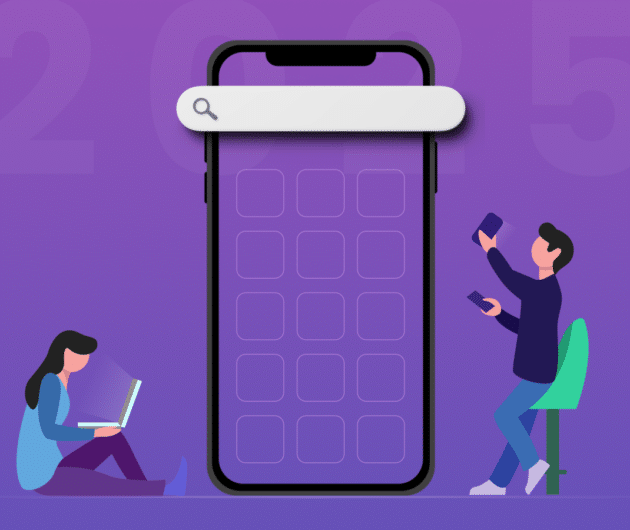AI in Mobile App Development: A Definitive Guide
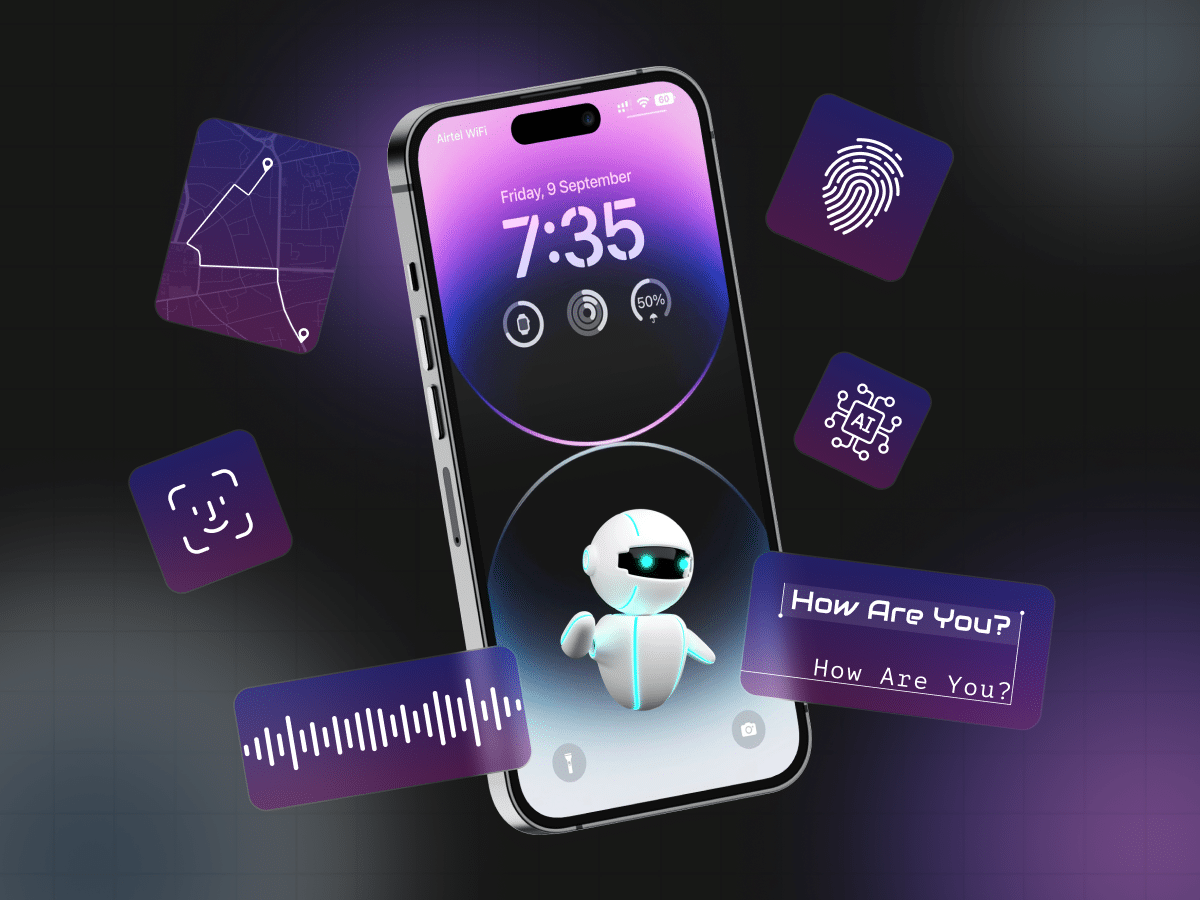
-
Jignesh Nakrani
- October 18, 2023
- 7 min read
We live in a time when technology is all around us, and our smartphones have become like our trusty sidekicks. The introduction of Artificial Intelligence in mobile app development has made our apps more fun and added new things we can do with our phones. Artificial Intelligence can do amazing stuff like understanding what we say, recognizing pictures, and talking to us like a friend.
Now, let’s talk about some numbers. According to Statista, “The market size in the Artificial Intelligence market is projected to reach $241.80 billion in 2023 and is expected to reach $738.80 billion by 2030.
That’s a lot of money, showing how much people believe in AI. But wait, there’s more to discover! In this blog, we will dive deeper into the magic of AI in mobile app development. We will show you what AI can do in apps and how it’s making smartphones even smarter. Get ready for a journey into the world of AI and mobile apps!
The Influence of AI on Mobile Apps to Enhance Performance
AI’s influence on app development is truly transformative. It empowers apps to understand, adapt to, and fulfill user needs more effectively. Explore the ways AI technology is shaping the future of mobile app development, elevating their intelligence and effectiveness.
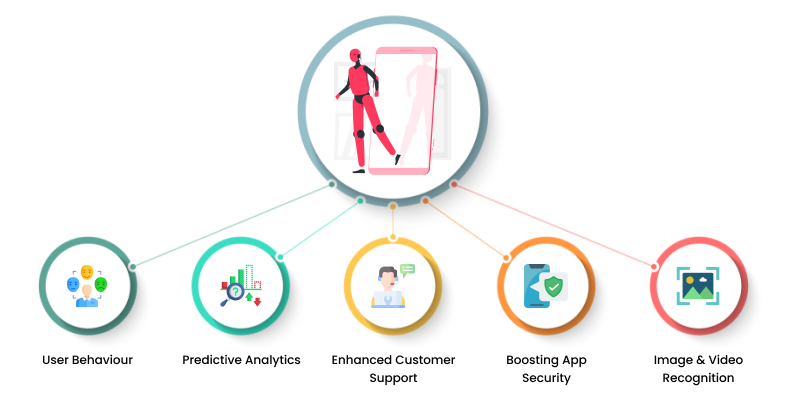
• Understanding User Behavior
AI can track how users interact with mobile apps, like which buttons they click or how long they spend on each page. For example, if an e-commerce app notices that users often abandon their shopping carts at the payment stage, AI can help developers identify this problem and make it easier for users to complete their purchases.
• Predictive Analytics for Personalized Recommendations
Imagine using a music streaming app. AI can analyze user’s past song choices and recommend new tracks that match their taste. For instance, if they have been listening to a lot of rock music, the app might suggest similar rock bands they haven’t heard yet.
• Enhanced Customer Support
AI-powered chatbots in apps can quickly answer common questions. For instance, a travel app might use a chatbot to help users find and book flights, making the process faster and more convenient.
• Boosting App Security
AI can detect unusual activities in a banking app. If it notices a strange login attempt from a different country, it can ask for additional authentication, ensuring the financial data remains secure.
• Image and Video Recognition
Social media apps often use AI to recognize faces in photos, making it easier to tag friends. Additionally, shopping apps can use image recognition to let users take a picture of an item they like and find similar products for sale.
Also check: How to Build an AI-based Chatbot App Like Replika?
Top 3 AI-Powered Tools and Frameworks for App Development
In today’s mobile app development landscape, AI-driven tools and frameworks play a pivotal role, in revolutionizing the way apps are created. These technologies not only reduce coding efforts but also streamline development processes, ultimately accelerating app delivery. In this segment, we will explore the top AI-powered tools and frameworks that have reshaped the world of app development. Let’s delve into their functionalities and the benefits they bring to the table.
| Tool/Framework | Description | Key Features & Advantages |
| TensorFlow | An open-source machine learning framework that simplifies the design and training of ML models. Offers a vast library of APIs and pre-built functions for tasks like image classification and speech recognition. Compatible with mobile devices, making it ideal for mobile app development. |
|
| PyTorch | Widely used for building deep learning models and neural networks. Known for its dynamic computational graph and GPU acceleration, enabling faster training and experimentation. Highly adaptable and user-friendly. |
|
| Dialogflow | A tool powered by Google Cloud with Natural Language Processing (NLP) capabilities. Used to create robust conversational interfaces, such as virtual assistants and chatbots. Offers a user-friendly interface and ready-made conversation models. Integrates easily with messaging platforms. |
|
Top AI Technologies for Mobile App Development
AI technologies are being used to develop more intelligent, engaging, and personalized mobile apps than ever before. Here are a few examples of how AI is changing the way mobile apps are developed and used:
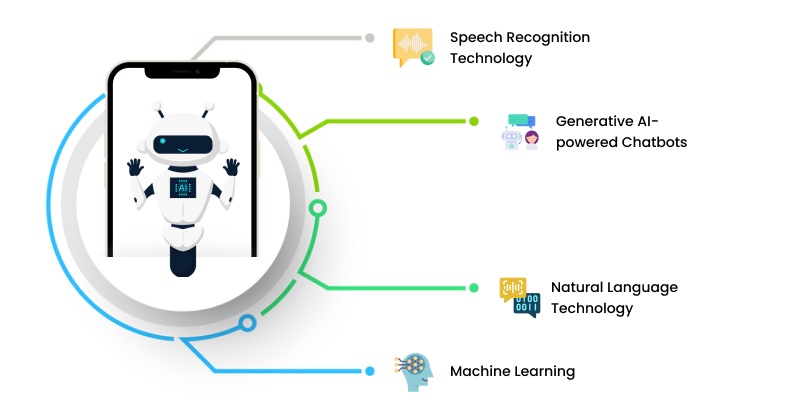
• Speech Recognition Technology
It has become a cornerstone of AI-powered mobile apps. Popularized by virtual assistants like Google Assistant and Siri, this advanced system enables users to interact with their devices through spoken commands. Essentially, it translates spoken language into a format that computers can comprehend and act upon.
The significance of speech recognition is underscored by its widespread adoption in mobile app development. This integration is in harmony with current AI trends, ultimately leading to more enriched user experiences.
• Generative AI-powered Chatbots
Chatbots play a pivotal role in mobile app development by facilitating engagement with both new and existing users. These conversational agents are designed to swiftly understand and provide immediate responses to user queries.
Generative AI chatbots are seamlessly integrated into mobile applications to streamline communication processes and enhance customer support services. Their ability to generate dynamic responses fosters more efficient interactions with app users.
• Natural Language Technology
Incorporating natural language technology into mobile applications is a strategic move that elevates customer support services. This AI technology is employed to comprehend and process the nuances of human language, resulting in more natural and fluid interactions between apps and users. With the capability to discern the intricacies of human language, mobile apps can deliver personalized responses and relevant solutions, thereby enhancing user satisfaction.
• Machine Learning
Businesses that rely heavily on data-driven insights and forecasts are leveraging the power of machine learning in mobile apps to enhance their app capabilities. By incorporating machine learning technology, mobile apps can provide valuable insights and actionable recommendations, ultimately improving user experiences and app performance.
Use Cases of AI in Mobile App Development
Artificial intelligence (AI) is rapidly transforming the mobile app development landscape. AI-powered apps offer a wide range of benefits, including improved user experience, increased efficiency, and enhanced security.
- Personalized recommendations: AI can be used to analyze user data and behavior to provide personalized recommendations for products, content, and services. This is commonly seen in music and video streaming apps, news apps, and e-commerce apps.
- Image and video recognition: AI can be used to recognize and classify images and videos. This can be used for a variety of purposes, such as augmented reality, object detection, and image search.
- Chatbots and Virtual Assistants: Chatbots powered by AI can offer customer support, answer user queries, and provide a more interactive and engaging user experience.
- Security: AI can be used to improve the security of mobile apps by detecting and preventing malware attacks, unauthorized access, and data breaches.
Here are some examples of popular mobile applications that utilize AI:
- Netflix: Netflix utilizes AI to give recommendations for movies and TV shows based on what users watched before and what they seem to enjoy.
- Amazon: Amazon uses AI to recommend products to users based on their purchase history and browsing behavior.
- Google Maps: Google Maps uses AI to provide users with real-time traffic updates, directions, and estimated travel times.
- Face ID: Face ID uses AI to recognize and authenticate users based on their facial features.
- Siri: Siri uses AI to understand and respond to users’ natural language queries.
Also check: Why AI is Beneficial for the Growth of Healthcare Venture?
How to Use AI in Mobile App Development
Here, we outline the five key steps to follow in how to use AI.
Step 1: Define Your AI Objectives
Start by identifying the specific objectives and goals you want to achieve with AI in your mobile app. Determine how AI can add value to your app and benefit your users. For example, you might want to improve user personalization, enhance recommendation systems, or automate tasks.
Step 2: Choose the Right AI Technologies
Select the AI technologies and tools that align with your objectives. Common AI technologies for mobile apps include machine learning, natural language processing (NLP), computer vision, and speech recognition. Depending on your project, you may also need to decide whether to build custom models or use pre-trained models and APIs.
Step 3: Collect and Prepare Data
High-quality data is crucial for AI success. Gather relevant data that will be used to train and fine-tune your AI models. Ensure the data is clean, well-labeled, and representative of the problem you are trying to solve. Data preparation, including cleaning, preprocessing, and feature engineering, is a critical step in AI implementation.
Step 4: Develop and Integrate AI Models
Develop AI models using the chosen technologies and the prepared data. This step involves training, testing, and refining the models until they meet your desired performance criteria. Once you have trained models, integrate them into your mobile app’s architecture. Ensure that the app can send data to the models for inference and receive the results.
Step 5: Test, Iterate, and Optimize
You can partner with an AI app development company to conduct thorough testing of your AI-powered mobile app to identify and fix any issues, ensure accuracy, and improve user experience. Gather user feedback and iterate on your AI models and app features accordingly. Continuous optimization is essential to enhance the AI’s performance and adapt to changing user needs and preferences.

How Much Will It Cost to Develop an AI-based Mobile App?
AI-based mobile applications are more expensive to build than traditional apps. This is because AI development requires specialized skills and expertise.
Developing AI mobile apps can vary greatly in cost depending on a variety of factors such as the complexity of the AI features, the size and experience of the development team, the features you want to integrate, and the amount of time required for development.
However, the benefits of utilizing AI in mobile apps can greatly outweigh the costs, including increased efficiency, improved user experience, and the potential for new revenue streams. It’s important for businesses to carefully evaluate their goals and budgets before embarking on an AI app development project.
Typically, the cost to build AI apps ranges from $30,000 to $80,000 or more. It is always a good idea to get a price estimate from an experienced artificial intelligence development company for better clarity.
Final Words
AI has become an indispensable part of mobile app development and the synergy between AI and application development offers endless potential, making it essential to embrace artificial intelligence development services. The revolution is underway, and AI will continue to drive innovation. If you are looking for an AI-based app development company for your needs, partnering with XongoLab can lead to exceptional benefits for your business. With our expertise and innovative technology, you can create intelligent and personalized applications that cater to the unique needs of your customers.
Don’t wait any longer, reach out to XongoLab and revolutionize the way you engage with your audience. Together, we can transform the world with cutting-edge AI technology.
You may also like
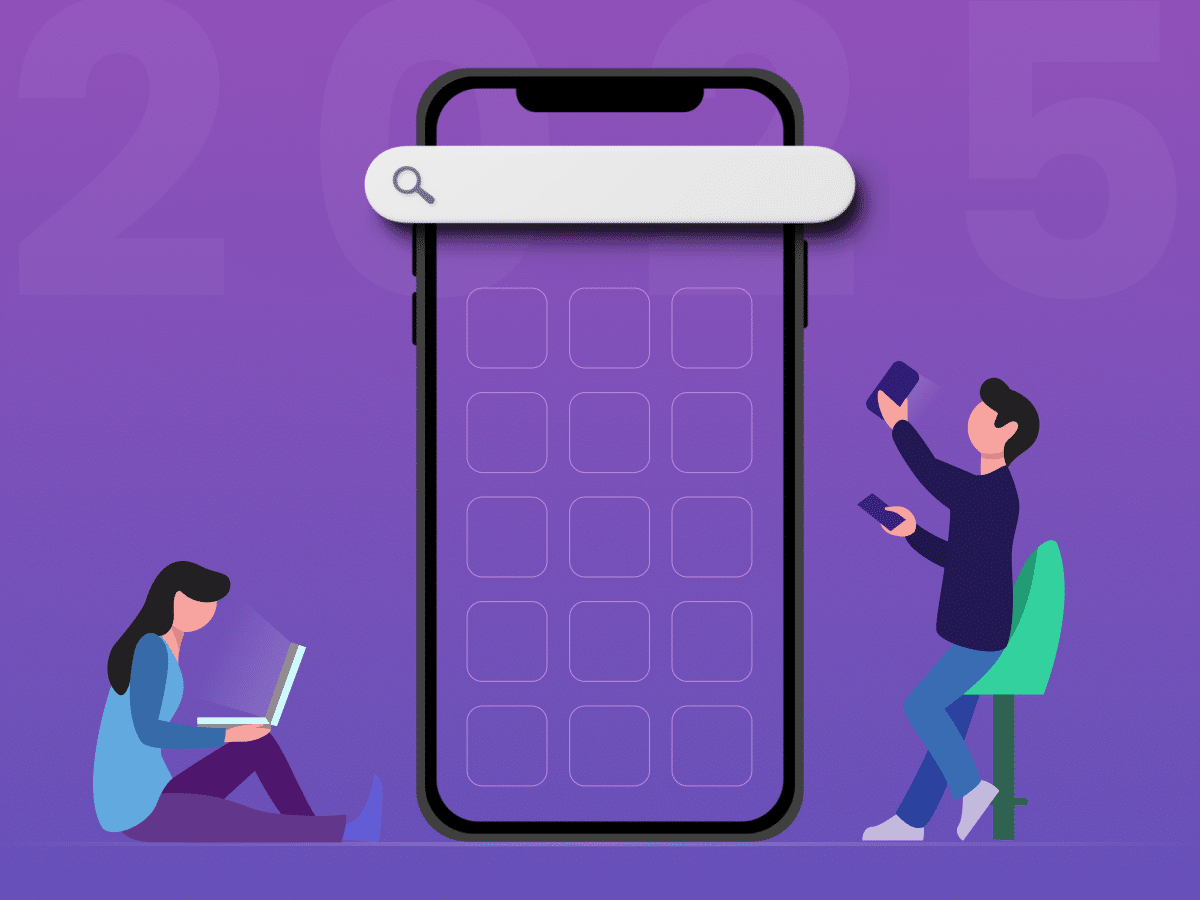
How to Choose the Right Mobile App Development Company
-
Ankit Patel
Imagine this: you’ve got a brilliant app idea that could revolutionize your business, take it to new heights, and transform your entire customer experience. But without the right team to… Read More

How Much Does it Cost to Build a Salon Booking App like Fresha?
-
Ankit Patel
We all have witnessed the buzz in the world of beauty & wellness, and it’s booming every day thanks to the fast-paced and stressful lifestyle. In an era where time… Read More

A Complete Guide to Hotel Booking App Development With Cost
-
Ankit Patel
Whether it’s a corporate business trip or a relaxing vacation with friends, finding the right hotel at the right time and a seamless hotel booking experience is not a luxury… Read More

